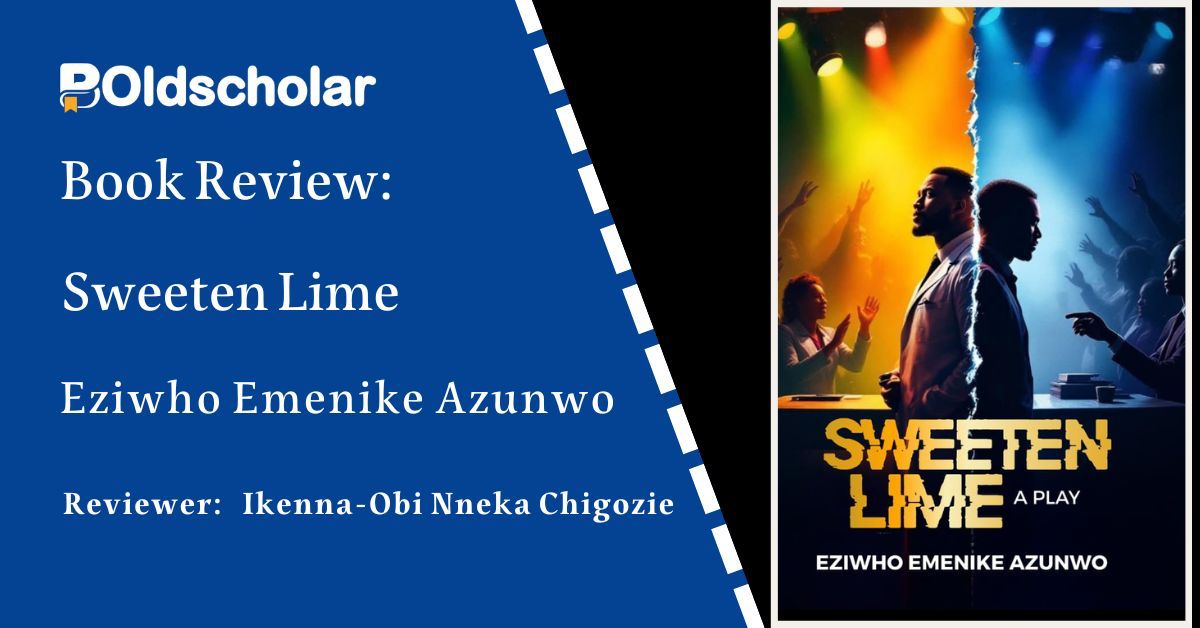Title: Rninyna Chiokike
Genre: Drama
Author: Eziwho Emenike Azunwo
Year of Publication: 2024
Edited & Published in Nigeria by: Covenant Daystar Publishers, Port Harcourt
Pagination: 46
Reviewer: Oshioreame, Kester Esikhobome
Institution: Rivers State University, Port Harcourt, Department of Theatre and Film studies
Abstract
Whereas marriage is ordained by God, as the Christian’s Holy Writ says, the consummation of a Christian marriage by a priest in the gathering of saints and before witnesses, coupled with vows taken by the couple, congregational prayers, and blessings from both parents and families, is not a guarantee or immunity that the marriage won’t experience crisis or encounter violence of various shades and end in a bitter divorce, separation, or even death, especially of the female gender. This study interrogates the salient issues that pervade the marital space in contemporary times and the possible causes of the prevailing tensions that often culminate in tragic ends. One such issue is narcissistic masculinity, in which the male gender projects his egotism over the feminine genders' stoicism. Because both concepts are diametrically opposed, male dominance and domineering attitudes are taken to preeminence and driven to uncontrollable heights by most men to the detriment of the women in the marriage; it results in avoidable deaths, as we find in Emenike’s Rninyna Chiokike. How do we find a middle ground or eliminate this anomaly is what this study seeks to address.
Synopsis
Rninyna Chiokike by Azunwo Eziwho Emenike is a marital and domestic narrative written in one act and broken into nine scenes. It is about a family ruptured in the all-too-familiar drama of marital squabbles that has been a prominent thematic thrust of most marriage narratives today. The story revolves around Rita, a devout Christian and faithful wife of an insensitive, proud, self-aggrandizing, megalomaniac narcissist of a careless husband. Charles was more committed to his mobile phone than he was to his home, marriage, and family. Charles cuts a perfect picture of an abusive husband to the degree that he thrived on issuing verbal invectives at will to his wife, who was not abrasive or offensive but a staunch believer in maintaining peace at the home front. Charles unashamedly extended his verbal outbursts to their only child and daughter, Rachael, exchanging words and banter like he was communicating with an adult.
In marriage, like in other aspects of life, communication is an inevitable factor that must not be overlooked. Communication is equally a two-way street. It takes two to communicate; when one speaks, the other should listen, hear, and understand before reacting or responding. But when one of the parties in the marital space dominates the communication by barking out threats and orders and never listens to or empathizes with the other, there is a problem. Thus, communication was a major deal breaker in the marriage between Charles and Rita. The communication blockade led to the disintegration of the home and family and the demise of Rita because of the terminal ailment of lung cancer. The health of Rita deteriorated, amongst others, because of spousal neglect and the obstinate and opinionated attitude of Charles. Being destitute of communication, he vehemently and arrogantly refused to communicate his job loss to his wife either because of pride or an attempt to maintain a false impression already created on the home front of a breadwinner who is gainfully employed. He also never allowed Rita to communicate her private struggles and pains, as all attempts by Rita were rebuffed and used as an opportunity to gaslight her. That which Charles never allowed Rita to communicate, Dr. Ike eventually communicated to him, albeit too late, when Rita had passed.
The drama also draws attention to the potency and effect of the role, engagement, and commitment to a community that can play in the lives of individuals. Rita had an obsession for divinity. Her dedication to the things of God and His kingdom was a coping mechanism and a comfort in her dreary moments. The fellowship she shared constantly with her sisters, like Fumi, Chidi, and Margaret, in no small measure helped to ease the pressure she had in her domestic/marital space. Although physical healing did not come from such fellowship, the resort to prayers for each other concerning issues they struggled with martially probably sustained them through their pain. However, it is worth mentioning that as most Christians are wont to act these days, Rita would rather cover up her pain with a half-hearted smile, and when she speaks at all, she does so in abstraction, which is suggestive; more often than not, such attitudes communicate anything but the real issue.
Ultimately, Charles was a great example of bad parenting. His ego, lack of attention, and careless disposition toward their daughter and only child, Rachael, drove Rita to take a drastic decision to will all of her physical assets to Rachael before her death because she was unsure of his ability to care and cater as a single parent for the young lady. In itself, that was a moral indictment on fatherhood, but unfortunately, the Charles’ of this world are often too self-indulgent and absent- minded to care about the impact of their actions on others. Rachael, though young, saw, felt, and was severely impacted emotionally and otherwise by Charles’ insensitivity. His hypocritical attitude was not hidden from Rachael, especially how he pretended to be a nice person and created the impression that all was well within their home when the pastor visited with them— that was a bad way to raise children, as children learn more from what they observe than what they are ‘commanded’ to do by their parent(s):
MIKE: (Smiles cheerfully) "Mr. Charles, how are you doing today?"
CHARLES: "Pastor, you don’t need the Holy Spirit to tell you I’m fine..." (They exchange a handshake.) "Please, have a seat." (They both sit down. Charles turns to Rachael. "I don’t think you need to be told to get something for Pastor Mike..." (Rachael makes a move) (Azunwo, p. 31).
The question here is, was Charles really fine at this moment? But typical of hypocrites like him, he had to use the Holy Spirit to lie and feign an atmosphere that was non-existent.
The tragic end was Rachael’s outright rejection of Charles as a father, which signaled the ultimate disintegration of the home. Whereas the self-imposed spell he cast on himself or the scale on his eyes fell off at the last moments of this marital narrative, the journey to redemption was a little too late.
Author’s Bio
Dr. Eziwho Emenike Azunwo
Playwright | Scholar | Educator | Academic Leader
Dr. Eziwho Emenike Azunwo, fondly known as Academic Rabbi, is a distinguished Nigerian playwright, accomplished scholar, and seasoned educator, currently serving a third tenure as the Acting Head of the Department of Theatre and Film Studies at Rivers State University, Port Harcourt, Nigeria. Renowned for his intellectual rigor, creative excellence, and transformative leadership, Dr. Azunwo has made outstanding contributions to the fields of drama, theatre, film studies, and applied research within Nigeria and internationally.
He is a product of State School One Ndele, St. Andrews State One, Diobu and Baptist High School, Borikiri, where he served as Deputy Senior Prefect. He earned a Doctor of Philosophy (PhD) in Applied Theatre from Nnamdi Azikiwe University, Awka, preceded by a Master’s degree in Playwriting and a Bachelor of Arts in Theatre Arts from the University of Port Harcourt. His research interests span playwriting, gender studies, dramatic theory and criticism, and contemporary African drama.
Dr. Azunwo has authored over 103 original plays, including Gbuji, The Last Don, Stained, The Same Jesus, 1978, Suffering in Paradise, Ele Gbaka, Oroma Hotels, Concealment, Azimelo Gbene, and Shan Inna, among others—many of which have received critical acclaim for their cultural relevance, spiritual insight, and innovative storytelling. He has published over 50 scholarly articles in reputable international journals, including a widely recognized piece on women empowerment and domestic violence in Nigerian video films, listed among the top 700 global scholarly articles of 2018 by Fan Studies et Culture Populaire in France.
A prolific academic and institution builder, Dr. Azunwo founded both the RSU Journal of Theatre and Film Studies and the Elegbakna Journal of Theatre and Film Studies, pioneering new spaces for Nigerian scholarly expression. He spearheaded the groundbreaking Sekiology Conference, recognized as the largest Theatre and Film Studies conference in Nigeria’s history, and led hybrid playwriting workshops that have empowered students and professionals across the nation.
In his current administrative capacity, Dr. Azunwo has led sweeping reforms in the department, including acquisition of essential academic tools, the establishment of a department website, and the mentorship of students to First Class distinction. He played a central role in graduating the department’s first postgraduate students, producing widely celebrated productions such as Yester-Gone, Stained, and The Last Don.
Dr Azunwo is the Editor-in-Chief RSU Journal of Theatre and Film Studies and Elegbakna Journal of Theatre and Film Studies.
Dr. Azunwo is a devout Christian who integrates his faith with his vocation, using theatre as a medium for spiritual and societal transformation. He is deeply involved in community service and has served in various university committees, including roles such as SERVICOM Officer, University-Wide Examination Committee Member, and Coordinator for Community Service at multiple institutions. His early service included roles with Shell Petroleum Development Company as a student mentor and Youth Corps Liaison Officer in Kebbi State, where he also initiated state-level academic and tourism projects.
He holds memberships in professional bodies including the Society of Nigeria Theatre Artistes (SONTA), National Association of Nigerian Theatre Arts Practitioners (NANTAP), Association of Nigerian Authors (ANA), and Academic Staff Union of Universities (ASUU). He is also a proud alumnus of CRABITES Alumni Association and a member of Boys Brigade Nigeria.
Notable among his recognitions are:
NLNG University Scholarship Award (2002–2006)
Best Philosophy Student, University of Port Harcourt (2002)
Most Vibrant Scholar Award, Department of Theatre Arts, UniPort (2005/2006)
Award of Recognition for Contributions to Departmental Sustainability by Port Harcourt Comedy Club (2023)
Commendation Letter from the Management of Rivers State University (2024)
Recipient of Society of Nigeria Theatre Artists (SONTA) Lifetime Achievement Award 2025.
Dr. Azunwo's legacy is defined by excellence, mentorship, innovation, and a relentless commitment to advancing Nigerian theatre and scholarship (E.E. Azunwo, Personal Communication, September 20, 2025).
THEMATIC CONCERNS IN RNINYAN CHIOKIKE
Narcissistic Masculinity
Charles’ character portraiture embodied the essence of a core Narcissists who are majorly preoccupied with their ego, self-interest and a conscious and deliberate effort to not just assert but also impose their masculine authority by every means possible. Charles aptly captures the “four Ds of Narcissism” which are; deny, dismiss, devalue and divorce (Gill Law Group, 2021). Although the fourth ‘d’ didn’t happen in the text under review, that was only because of Rita’s death; there is every indication that the marriage was headed in the direction of divorce. It is obvious that Charles’ communication with Rita throughout the text exhibited lack of respect for the feminine gender (Rita). His domineering and suppressive attitude rang loudly in his speeches:
CHARLES: Do you now scheme to destroy my home? (Pause) Listen, woman, I shouldn’t be here bantering words with you. In our fathers' days, when they married many wives, you wouldn't dare stand here and argue with me. My decisions stand unchanged. You can't be my equal in any form—be it here in the house, in the church, or in the world to come (Azunwo, 2024, p.18).
Rninyna Chiokike explores how masculinity as projected in the character of Charles, exhibit inflated sense of self-importance and emotional detachment. Charles was obsessed with avowed desire to control and putting up an impression irrespective of his own frailties and psychological emptiness. Acting like tyrants, they insist on holding firmly to every string that can sustain their psychological dominance over the female gender/victim.
Domestic/ Emotional /Verbal Abuse
The towering and domineering character of Charles in Rninyna Chiokike, compounded the life of the wife, Rita and the daughter Rachael. As a careless husband and father that he was, Charles could not be bothered by how his words which were chiefly hurting, demeaning and offensive impacted the hearer he delighted in the art of gaslighting, and spewing diatribes aimed at debasing the hearer. The fact that he did not even spare his young daughter and only child speaks to his lack of emotional intelligence, and mastery in emotional neglect and isolation. Deliberately or otherwise these acts of his actively compounded Rita’s trauma and her terminal ailment and eventual death. Charles deployed words to deliberately traumatize and taunt Rita and that undoubtedly would have caused psychological damage that cannot be physically assessed. For instance Charles says to Rita in an accusatory tone:
CHARLES: You gave birth to a seed of a child in this house who does nothing but copy every trait of your lifestyle in my own house... Are you even enlightened enough to know that I need a male child? (Azunwo, 2024, p. 26).
Communication Breakdown in Marriage
Charles never encouraged dialogue in his home and marriage. He dominated the conversations. He set the agenda and did all the talking, having a ready, caustic, negative and derogatory response to any thing Rita or Rachael had to say in response to his tirades. Communication, to be effective should be based on reciprocity, but the marriage in this drama text was strewn with stonewalling. Thus a toxic ambience pervaded the home and led overtime to the disintegration of the family. The attempt at a dialogue initiated by young Rachael was rebuffed with a tinge of bitterness and intimidation by Charles:
RACHAEL: (Hesitates) "Daddy, you have been acting strange lately... You no longer treat me and Mummy nicely as before. Is there anything we have done wrong? Please tell me, we can make amends..."
CHARLES: (Smiles) "My dear Rachael, all you once experienced was in the Old Testament... and what you are experiencing now is the New Testament." (Turns to Rachael) "You and your mum might have done something wrong that I don't know of... (Azunwo, 2024, p. 30).
Failed Parenting
Charles unashamedly cut the picture of a failed parent, his irresponsible and degenerate approach is a sad decline from the exalted pedestal and privilege of raising a generation that should be an improvement of his generation in the marriage space but he failed fatherhood with such ignominy. The Charles’ of this world are a moral and parental indictment. He represents patriarchal parenting that offers matriarchy the bragging rights of being champions in the parenting arena, however datable the claim may be.
Spiritual Coping Mechanism
The significant role of community participation, involvement and engagement is depicted in the text as it became a buffer for Rita to endure all the personal struggles, health challenges and domestic banters meted on her by Charles. The comfort and support that one expected Charles to have provided for her in the home, making it a safe haven for her and her daughter, she found outside the home through faith and fellowship with her ‘sisters’. The hope she derived from the testimonies, prayers, sharing of thoughts and burdens and the listening ears accorded her in the fellowship became a mechanism to cope through her dreary moments. Imagine if that alternative wasn’t available, loneliness and isolation would have worsened her terminal condition faster than ever. It is critical therefore to state that one must not discountenance the fundamental role belonging to a community plays in the affairs of life. Although one may question the unique approach employed in this community as touching Rita’s situation, but the moral is, belonging to a community does help in coping with life’s challenges especially in guarding against the harmful effects of isolation and lack of communication.
Fumi for instance consoles Rita by encouraging her with the fact that her situation isn’t an isolated one but a shared experience in marriages:
RITA: (Nervous and forces a smile) Thank you very much, Sis. Fumi... (Braces herself and takes a deep breath) Anyways, it's not a big issue, I could say. But my husband's sudden change of attitude towards me is disturbing. He doesn't seem to care anymore about me or our daughter. He isolates himself from us, leaves me all alone in our room, and sometimes doesn't even eat the food I prepare... (Gets emotional)
FUMI: (Consoles Rita) It's okay. This is something we've experienced in one way or another in our own homes too. These challenges are inevitable in marriages… (Azunwo, 2024, p. 22).
CHARACTER ANALYSIS IN RNINYAN CHIOKIKE
CHARLES – He is the villain. A husband and father is portrayed as a chauvinist and self- centered human who is selfish and opinionated. He aptly is represents narcissistic masculinity, men whose preoccupation and delight is the suppression of the feminine gender. They are masters in battering and violence against women and they do this physically, socially or psychologically. In Rninyna Chiokike psychologically battered his wife, Rita who was terminally ill with lung cancer. Charles was so engrossed in his personal interests –job, current/political affairs, etc that he isolated and distanced himself from his family and their welfare. His attitude is similar to that of Lawal in Osofisan’s Altine’s Wrath where Altine was rendered dumb by the husband, a corrupt civil servant primarily because of her social status as determined by her level of education, which was non-existent; being uneducated. (Yacim & Matthew, 2019, p. 6) describe the narcissistic, egoistic and atavistic attitude of such characters well, using Lawal as an archetype: Lawal: ...You see the kind of home I have! On one side, a stark illiterate of a wife, who's as dumb as the chair you're sitting on!... (Altine, 6)
He further shows his discontent for women through these oppressive words to Aina when she challenged his attitude towards the non-compensation of the landowners by government.
Women here don't dare raise their voice where men are speaking! And you'd better get that back into your head (Altine, 18).
The patriarchal nature of a society controlled by men who subordinate the female gender to their selfish and hedonistic tendencies due to the atavistic belief that a woman is inferior to her male counterpart and most times subjected to undignified and harsh treatment by the male has been with us for decades. The endemic nature of violence is also seen in his incessant scolding of his wife and the houseboy, Ahmed. He dehumanizes both his wife and Ahmed.
From the foregoing, it is evident that Charles is hedonistic and feed their egos through dehumanizing the female folk by every oppressive means they can muster.
RITA – She is the feminist heroine. A traditional and typical African wife, reared to be subservient and non-confrontational even the in the face of direct, persistent and deliberate provocations from their spouses. They prime respect for their husband and would sacrifice even their lives to to keep the bonds of peace and harmony in their home. They will stay in their marriage at all cost even when the same institution is choking the life out of them. More so, Rita in Rninyna Chiokike is described as a devoted Christian whose faith upholds the sanctity of marriage with the marital vow of “For better for worst, until death do us part.” Indeed, in another place under another faith, maybe, Rita would have found her way out of the toxicity she was locked in, in the name of marriage. But Rita was patient and endured till death forced a separation from the imprisonment she was wedded into. Again, Altine in Osofisan’s Altine’s Wrath bears close similarity in portrayal, with Rita to the extent that they bore and endured humiliation and pain meted out by husbands that were careless, uncaring and daredevils. Unfortunately, both Altine and Rita never made it out alive in the marriage they were locked in. That calls for a rethinking in the manner such desperate situations in marital spaces should be handled.
According to (Oyewumi, n.d.) Dr. Aina, in Osofisan’s Altine’s Wrath becomes a voice for the ‘voiceless’ in the marital space as she challenges Lawal in his unjust seizure (forfeiture) of the people’s farmland:
Aina: who caused it, I mean. You men can be terrible. I know now from experience. You all think marriage is the modern version of the Slave Trade (Osofisan p.13).
RACHAEL
Though characterized as young and an only child (female); she is a victim of a parenting disaster championed by her unfortunate father, Charles. Rachael represents the future of matrimony; a survivor of sort. Young as Rachael was, she was exposed to the wrong side of marriage and parenting. She saw, felt, and was severely impacted emotionally and otherwise by Charles’ insensitivity. His hypocritical attitude was not hidden from Rachael, how he pretended to be a nice person and that all was well within their home, when the pastor visited with them was a bad way to raise a child as children learn more from what they observe than what they are ‘commanded’ to do by their parent (s). The psychological impact of such immoral exposure is that this young mind may detest the masculine gender and the institution of marriage in general unless she goes through therapy from the trauma her young mind experienced in her home and from her father and the ill treatment meted out to her late mum. The tragic end was Rachael out rightly rejecting Charles as a father signaling the ultimate disintegration of the home.
RACHAEL: (Bitterly in tears) I will never forgive you… You are wicked… You never paid attention to Mum… (Dr. Ike consoles her)
Conclusion/Recommendation
Although there are expectations from both parties when a marriage is contracted or consummated, there is none who will expect anything negative to issue from their marriage; however, there is always a yawning gap between expectation and reality. What one expects often runs counter to what one gets as result at the end of the day. Many homes are hitting the rocks today due to unrealistic expectations especially from female folks who often expect to live happily ever after. But when reality confronts the castle they had built, about their ideal husband and home, hope blights, and many begin to slide into depression and think that divinity has failed or they scream; “men are scum.” That is often an incorrect conclusion.
On the premise of the assertion above, it is important to be realistic in our approach to and expectation from our spouses and marriage. One of the likely reasons for failed expectations is comparisons. Many tend to do unhealthy comparison in marriage. Husbands comparing their wives with their mothers, perhaps sisters or former girlfriends, vice versa; all of such comparisons contribute to the disintegration of many homes today. The earlier we accept that no two homes or marriages of human beings can be the same, the safer it would be for us.
Another critical issue to be given attention is the issue of healthy communication between spouses, it is important to encourage open communication in the marital space as much as possible. The idea of communicating in a manner that does not encourage dialogue but promote monologue that control or dominate conversations is often a deal breaker.
Finally, spouses must commit to responsible parenting, because the marriage space is not always about man and wife. They must act as custodians of a culture in homes where healthy future husbands and wives are raised and prepared for the future.
References
Azunwo, E. E. (2024). Rninyna Chiokike. Covenant Daystar Publishers, Nigeria.
Gill Law Group, PC. (2021, October 25). Four Ds of Narccisism: Deny, Dismiss, Devalue & Divorce. https://www.thegillfirm.com/blog/2021/october/four-ds-of-narcissism-deny- dismiss-devalue-divor/
Oyewumi Olatoye, Agunbiade. (n.d). Domestic Violence in Nigeria: a Literary Perspective in
Ben Binebai’s Karena’s Cross and FemiOsofisan’s Altine’s Wrath.
https://www.afjolih.org/wp-content/uploads/2025/01/T-AFJ-5-4-December-Oyewumi.pdf Yacim, Roseline Ande & Mathew, Vivan. (2019, July).
Femi Osofisan's Altine's Wrath (3)
https://www.researchgate.net/publication/334785450_Femi_Osofisan's_Altine's_Wrath_3
Share this post





Be the first to comment on this post